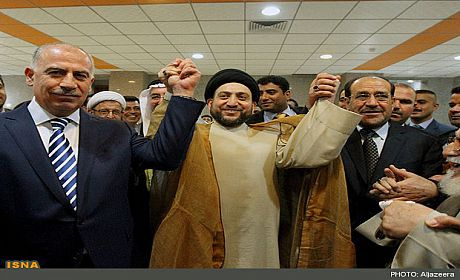Political Reconciliation in the Shadow of Threat of Disintegration

Iraq is going through days of political chaos and increasing insecurity. Exactly when ethnic and religious unrest is growing in Iraq, the political leaders of this country are attempting to hold reconciliation meetings to overcome the wave of political differences which has re-opened like a wound. On this basis, a reconciliation meeting between the political leaders was held last week in Iraq in the office of Seyyed Ammar Hakim, the Head of the Islamic Supreme Council.
This meeting of reconciliation between the heads of the executive and legislative bodies, with the presence of the leaders and representatives of some Iraqi groups, was initiated by Ammar Hakim, the Head of the Islamic Supreme Council. This move can be considered as a response to one year of attempts and the need to hold national dialogue in Iraq. Developments in Iraq during the past year have shown that, even more importantly than planning a security strategy, this country needs to return the Iraqi leaders to the negotiating table. This move was a missing link in the political structure of this country in the past two years and the divergence of Iraq’s political leaders in this regard has once before led to growing misunderstandings. Although Masoud Barzani, Ayad Allawi, and Muqtada Sadr were not present in last Saturday’s meeting, other personalities like Noori al-Maleki, Osama al-Najifi, Ammar Hakim, and others took part. The presence of these people in this meeting was a great opportunity to show their willingness or at least to prepare the ground for the next negotiation between the political leaders of Iraq. It must not be forgotten that at this time, which is one year before the parliamentary elections, Iraq needs national reconciliation at the level of senior political leaders and its impacts on society.
During these years, Iraq’s experience has shown that unrest, in all of its forms, affects the political atmosphere, thus, the continuation of this political tension and disputes can return the security situation in Iraq to its critical days. Last week, Iraq was the scene of extended violence and even sometimes witnessed religious battles. Meanwhile, the approach of the terrorists to target religious places and the places of worship of the Shiites and the Sunnis will lead to intensifying ethnic and religious sentiment among the people of Iraq.
Prior to the beginning of a new wave of explosions and terrorist acts during recent weeks, demonstrations and protests in the Sunni-inhabited provinces and their continuation following the election of the provincial councils indicated that this country could still be the scene of security developments and political disputes. The continuation and intensification of these disputes have led the government of Noori al-Maleki to be practically more fragile since its formation in 2010. This issue has led to the coming and going of the ministers of some groups, like the al-Iraqiya List and even Muqtada Sadr and the Kurds. Following recent political consultations, the Kurdish ministers returned to the cabinet and one day after the convergence meeting of the representatives of the political groups in Baghdad, there were talks of the willingness of al-Iraqiya to return its ministers to the cabinet.
Therefore, under these conditions and less than a year before parliamentary elections in Iraq, it seems that consensus among Iraq’s political groups is the only solution that the Iraqi groups can choose to save the country from the quagmire it is in. Furthermore, there are other elements that may put Iraq in the path of political turmoil which, in turn, would lead to ethnic and religious disputes.
During the past few weeks, and even before that, the willingness of some of the Sunni leaders of tribes and political groups and even officials in the Sunni-inhabited provinces to establish a Sunni territory - like what exists in Iraq’s Kurdistan province - threatened the solidarity of Iraq. Therefore, under these conditions, if these movements lead to the creation of religious and ethnic rifts in Iraq, this country will be faced with the storm of differences, disputes, and possibly disintegration. Inclinations toward independence-seeking in some Sunni-inhabited provinces are growing and in the Kurdish regions, differences between the central government and Iraq’s Kurdistan region have not yet been solved or reduced. Although there has been an agreement to create investigation committees to solve the differences, the demands of the Kurds, particularly in relation with the areas of dispute in Kirkuk and its surrounding areas – now Masoud Barzani or the Iraqi Kurds consider them as Kurd regions outside the territory – could create more friction among ethnic and religious groups in Iraq and destroy the opportunities of strengthening the political establishment in this country. That is why meetings between the representatives of Iraq’s political, ethnic, and religious groups could mean their return to the national dialogue, which will prepare the ground for an agreement and Iraq’s exit from costly disputes.

